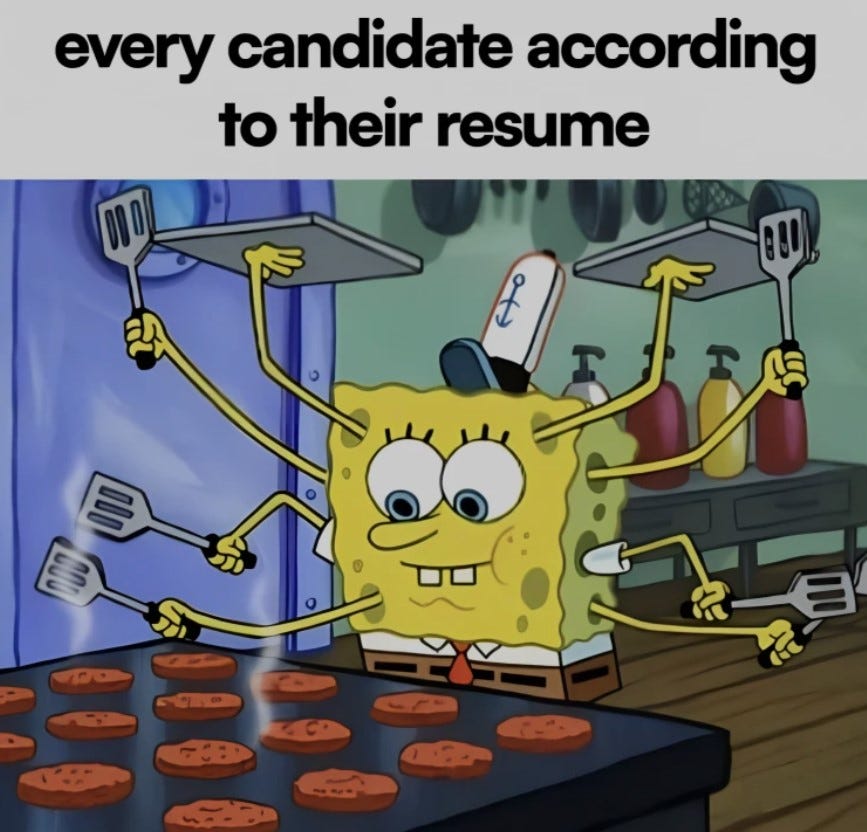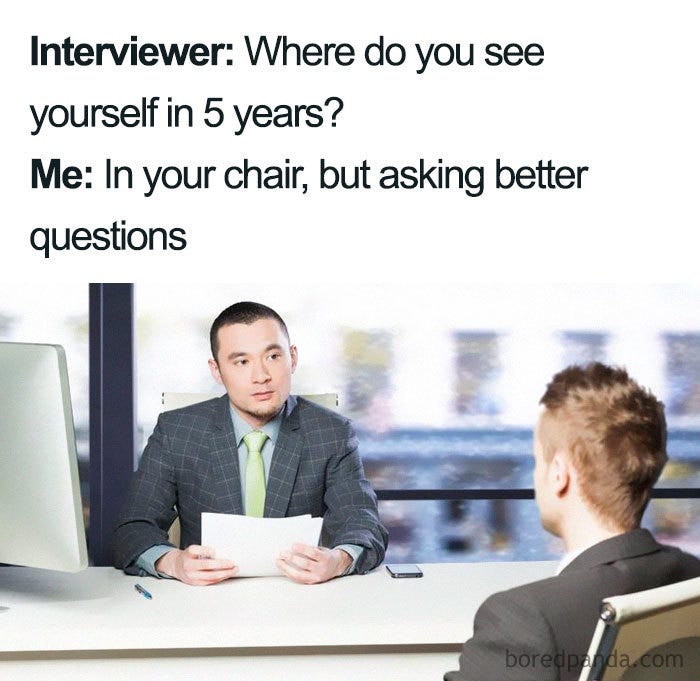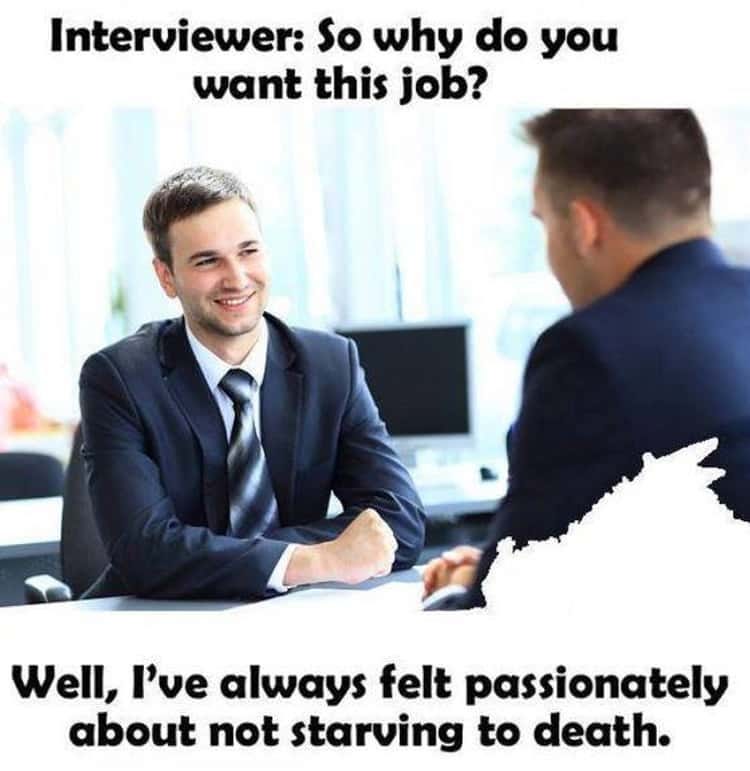“I knew instantly that the decision I’d just made would define the rest of my career. I would either be fired or promoted, immediately gripped with fear of the former. It turned out to be the most important moment of courage in my professional life.”
Opening a conversation with a premise like the one above is an example of the literary technique in medias res, or “starting in the middle.”
It’s a fantastic way to grab the attention of the listener, can be used by anyone at any skill level, and happens to be one of the most effective methods for seizing the initiative in a job interview.
Interview tactics are on my radar today, so I am putting them on yours.
We’re at a misshapen elbow in the job market.
Companies are laying people off and hiring them simultaneously.
Tech companies are raking big profits but not passing them on to workers.
Unemployment is low, burnout is high.
People who (a) don’t have jobs and (b) have jobs they don’t like are looking for work. Employers, sensing overgrown demand, are creating joke vacancies just to see who is fool enough to apply.
Any decent-looking job vacancy achieves instant Belle of the Ball status, flooded with interest.
This leaves recruiters swamped, weeding through hundreds of cheaply-lobbed applications.
Which in turn triggers a vicious cycle of impersonal, no-look rejections of over-qualified candidates. Which pisses them off and feeds an assumption of employers so abusive they enjoy kicking people who don’t even work for them.
As for candidates, they don’t know whether they’ve been powder-burnt or snake-bit.
The only way to succeed in a candidate-saturated market is to curate a keyword-laden CV, mine job listings for anything which doesn’t sound openly abusive, and then bombard recruiters with a gold-encrusted, embellished representations designed to beat human and inhuman filters.
Some of the things I see on Linked In these days — from both employers and prospective employees — crack me up. I’m reminded of being in the Air Force, which issues every airman a PhD in Orwellian Bullshit as part of indoctrination.
“Tactical Aerial Morale and Welfare Augmentation Apprentice.”
= Guy who hands out basketballs at the gym.
“Aerospace Organizational Recording and Compliance Support Specialist.”
= Clerk.
“Advanced Material Fabrication and Repair Craftsman.”
= Guy with hammer and drill who removes a stuck access panel from a jet.
When we needed him we just stood on the wing and hollered “Hey sheet metal!”
It would be excellent to live in a world where job descriptions actually described.
It would also be excellent, once someone’s managed to navigate the Byzantine maze and secure the bitty morsel of cheese known as a job interview, if that process would be a simple and fair.
But we don’t live in such a world. And as this strange world gets weirder, there grows a glut of advice out there about how to succeed in job interviews.
Most of it is pure garbage.
“Follow these 7 steps.”
If there were a 7-step plan for winning, everyone would follow it and win. This would birth a 6-step process to beat the 7-step folk. And so on. Soon, people would be getting hired by doing zero steps. Dogs and cats would start living together, feeding mass hysteria.
“Get some sleep the night before, and make sure your Uncle Harry doesn’t walk through your camera frame in his Fruit-o-the-looms.”
I was planning on being catatonic and breeding muskrats in the background during the session. Glad you said something.
“Just be yourself. And click the link in the comments to subscribe.”
Seriously.
Much as I counsel against the logical fallacy of discounting an argument based on suspect credentials, this isn’t a time for logic. It’s a time for rationality, and these are two very different things.
Unless you want to set pins in a bowling alley as your next professional act, this is a moment to carefully consider the advice you follow. Much of it comes from people who have seldom, if ever, followed it themselves. Their profession isn’t getting jobs or hiring people. They specialize in clicks, engagement, and the ornate facade of credibility. Ultimately their profession is separating you from your wallet.
Being the salty but well-intentioned curmudgeon I am, I intend to give you something different … something you won’t get from random online shit merchants.
Free, credible advice which is actually useful.
I’ve hired several hundred people, the vast majority salaried managers and functional experts for roles in high-pace operations.
I’ve twice in my career built new business units, personally hiring and developing entire teams.
At Amazon, I was on the hiring “Jedi Council” as a Bar Raiser, with hundreds of hours of intensive development to lead hiring panels and hold them accountable to an enviably rigorous process.
I’ve also passed many interviews myself. Importantly, I’ve failed a couple along the way, and those failures taught me a lot.
So here’s my nickel’s worth of free advice.
Know you’re in a game. This isn’t a linear, transparent, or fair process, even if it tries and pretends to be. It’s not a test of character. It’s not about who is best qualified for a role. And it’s certainly not about what anyone “deserves.”
Know how to win this game. Interviewers are collecting evidence and assessing it against a rubric. Understand as best you can what evidence they need to collect to justify hiring you. Bring that evidence to the game.
Be tactical. Yes, it’s important to do the standard stuff. Get sleep, eat properly, and situate yourself comfortably so you give clear, logical, structured responses that are easy to follow. But it’s also important you be as likable as possible. This makes it easier for interviewers to imagine you as a good teammate, and it tends to disarm, opening their minds to your evidence. Smile. Make eye contact. Try and enjoy the process (easier if you’re prepared and confident). Your enjoyment will be contagious.
 Tiktok failed to load.
Tiktok failed to load.Enable 3rd party cookies or use another browser
Be yourself. Sorta. If your normal temperament is that of thinly veiled hostility but you connect better when you work hard at it, this is the day to put in that work. If you get agitated or rattled by being interrupted or challenged, this is the moment to actively focus and work against those tendencies. Be yourself, but not just the average, everyday version. The best version. You on your best day.
Tell your story. Don’t be passive. Come to the interview with a book full of stories about all the times you were there to kick ass and chew bubble gum, and you ran out of bubble gum. If you’ve reflected on your exploits through the lens of the company’s stated value system, you’re in a good position to provide strong evidence. With a convincing enough body of examples showing your fitness for the role, the bits above about tactics and persona become far less relevant.
Tell YOUR story. Resist the temptation to talk about interesting things that happened to other people or to make up stories that fit the questions. Your own lived examples are more powerful. They expose your thought process. They showcase your individual actions and contributions. A good interviewer will probe for detail, and will quickly expose whether it’s your story or not.
Make me care in 60 seconds. Setting context has become fashionable these days, but there’s a lot to be said for hooking your listener quickly. Grab their attention with a fascinating premise and move straight into substance without a fluffy preamble. If you don’t captivate sufficiently, minds will wander, and the evidence you’re presenting could get missed.
Drop the script. No one wants to hire a cyborg. Know your stories, but don’t recite them from memory (or worse, from note cards). It’s a conversation, and that means you should want and expect the interviewer to speak. If they’re asking you questions, that means they are engaged, which is good. When I think someone is working from memory in an interview, I will work harder to knock them off stride so I can catch an unguarded glimpse of their reasoning.
Most of all, adapt what you do, including this advice, to the situation. Let your style drift and flow and adjust. If you’re too stilted, this can raise a flag about your flexibility or situational awareness.
I once led a panel where the candidate had created a minor concern about his ability to earn trust with less experienced teammates. Interviewers probed his emotional intelligence, and he just kept retreating into examples of his technical brilliance rather than adapting and letting his human side shine through. He reinforced the concern despite having the best of intentions. I’m sure he was a good teammate, but he was so wedded to his approach that he didn’t let himself show it. He lost out at a result.
Job interviews are hard to get these days. When you get one, do two things to win.
First, get interviewers to want to hire you by presenting yourself as someone good to work with; and second, give them the ability to make that decision by providing evidence you’re right for the role.
When you get your chance, crush it.
And then, just for giggles, turn down the job offer.
Tony is a former General Manager at Amazon and an expert on the hiring interview process. He specializes in giving unsolicited advice which is always free and sometimes helpful.














